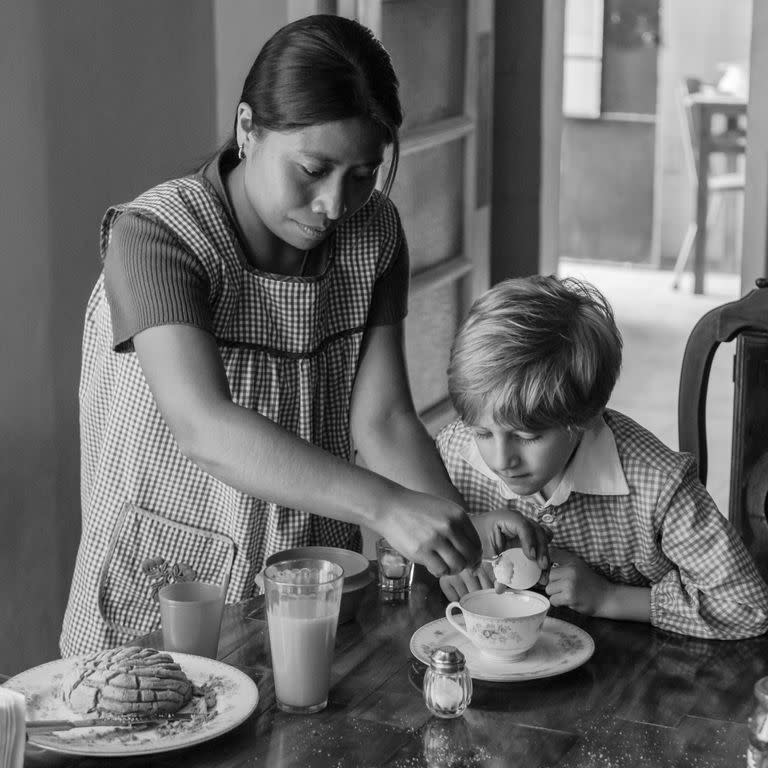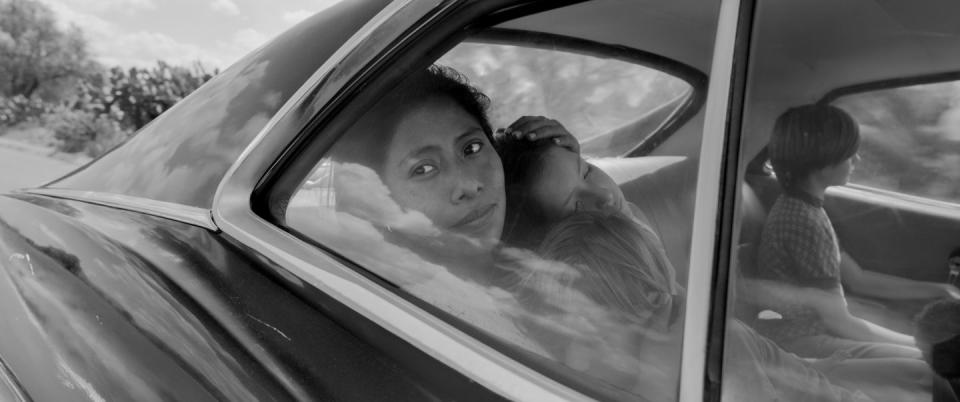Hands Down, Roma's Yalitza Aparicio Deserves the Best Actress Oscar

The Oscars are almost here, and with them begins the scramble to catch all the nominated movies-so you can make informed predictions during your viewing parties. The two biggest contenders? The Favourite and Roma, with ten Oscar nominations each. Both films are direct competitors in a few different categories, including "best actress in a leading role," for which Olivia Colman earned a nod for her portrayal of Queen Anne of England in The Favourite.
But in my opinion, it's Yalitza Aparicio's interpretation of the modest housemaid Cleo in the Netflix film Roma that deserves the trophy. While there's no doubt Colman delivered an Oscar-worthy performance (as did fellow "best actress" nominees Lady Gaga in A Star Is Born, Glenn Close in The Wife, and Melissa McCarthy in Can You Ever Forgive Me?) I’m rooting for Yalitza-and really, for Roma to sweep the entire ceremony on Sunday, Feb. 24.
In case you haven’t seen Roma (though it's on Netflix now, so you really should!), it's a mostly autobiographical film by Mexican director Alfonso Cuarón, based on his own childhood in the Mexico City district of Colonia Roma. As he told Vanity Fair, 90 percent of the scenes came out of his memory, and he even gathered furniture from his scattered family members to put together the set. He also cast actors that looked like the people in his life.

It's clear Cuarón took painstaking steps to make sure the film was as personal as possible. But rather than centering on himself, his story follows the lives of the women who raised him-particularly his mother and, most prominently, his nanny/maid, Liboria Rodriguez. Liboria-or "Cleo" as she's called in the movie-was so central to Cuarón's life, he and his team met with over 3,000 people in search of the perfect person to play her. After an extensive audition process, he selected Aparicio to bring Cleo to life on-screen.
Cleo is an integral part of the middle-class family she lives with, equal parts nanny and maid-the glue that keeps the household together. In the movie, we see how hard she works to maintain the house, take care of the kids, and deal with her own big life changes (which I won’t spoil for you yet), all while often not getting any of the thanks she deserves.

25-year-old Aparicio (who says she doesn’t consider herself an actress) has already made history, becoming the first Mexican woman to be nominated for best actress in a leading role in 14 years-and the first indigenous woman ever. Even more notable? The fact that Aparicio achieved this without any acting experience. At all. That's just one of many reasons I believe Yalitza Aparicio deserves to bring home the statue on Sunday night. Here are five more:
Despite Roma being her first (!) role, her performance was outstanding.
Aparicio's portrayal of Cleo was impeccable. Not only did she do justice to Cuarón’s own maid, but also to every muchacha that has ever helped a family in Mexico-my own included. Aparicio’s acting brought to life the type of character who is typically portrayed as secondary (or, more often than not, not portrayed at all) and made her compelling. Like Cuarón's family in the film-and many others in Mexico-I too had a Cleo in my life who took care of me and helped my mother run the house. And like Cuarón, I didn't really think about the impact she had on my family...until this film. But through Aparicio's exquisite portrayal, I couldn't help but look back to all the Cleos in my life-and feel grateful for the way they shaped my childhood.
Even for those who didn't grow up with a Cleo of their own, Aparicio's performance is incredibly poignant. Through her acting, we can feel Cleo’s tenderness when she gently wakes up the kids in the morning, her (spoiler alert!) apprehension when she discovers an unplanned pregnancy, and her immense pain when that same pregnancy results in a stillborn baby. The humanity Aparicio brings to Cleo allows you to both feel her pain and love her as if she were a part of your family.
When you also take into account the fact that Aparicio has never acted before, her performance is even more impressive. Only someone with real, natural talent could deliver such a strong performance without ever having a day of training.
She learned a new language for the role.
Though Aparicio’s parents are both of mixed indigenous heritage (her father has roots in Mexico's Mixtec region, and her mother has Triqui heritage), Aparicio didn’t speak Mixtec prior to this role. A native Spanish speaker, she studied Mixtec, the language of indigenous Mexican people, which is commonly spoken by servants in Mexico.
While actors often have to learn new skills and make changes in their life in order to get into character, learning a new language for a role is a hefty undertaking-and one that should be commended. No shade to the other leading ladies nominated in this category, but as far as I know, none of them had to master an entire language for their part.
It's also worth noting that while promoting Roma during awards season, Aparicio had to do press for the first time-despite not speaking English. And, she had never traveled outside of Mexico before. Though she may not be speaking English fluently just yet, she's clearly holding her own-and already has a favorite english word: "Whatever!"
She doesn’t care about the glitz and the glamour.
As Aparicio told the Los Angeles Times, she was born in Tlaxiaco, a small agricultural community in the Mexican state of Oaxaca, to a family of very modest means. Her father works as a street vendor, and her mother-like Cleo-is a domestic worker. She'd never even thought of acting as a profession; as a child, she didn't participate in choir or school plays, and her town didn't even have movie theater. While talking to fellow Mexican actor Diego Luna for an IndieWire interview, she revealed the only reason she auditioned was because her sister begged her to-and she only accepted the role because, I kid you not, Aparicio-who had just finished studying to become a teacher-“had nothing better to do.”

So it's safe to say that Aparicio is not acting to become a star and make millions-instead, she took on Hollywood because the opportunity presented itself, and now she’s just happy to be here. Aparicio is refreshingly humble and, as she goes on to tell the LA Times, she just wanted to do a good job and make Cuarón proud. In the same interview, she touches on the fact that after taking the role, she can now start to pay back her student loans-and in her conversation with Luna, she mentions she thought it would be a good way to help support her family. And her first big splurge with her new income? The books that she'd been waiting to buy.
Even now that Aparicio’s clearly made an impression on the industry, she’s hesitant to call herself an actress-and even more hesitant to make assertions about whether or not she’ll continue acting. As she told the New York Times: "I would be very open to continue acting, but even if I weren’t to continue acting, I would be very grateful for this opportunity and this experience."
I don’t know about you, but the fact that she doesn’t care about all the fanfare makes me want the award for her even more. Here’s a woman who took on a role just wanting to give it her best shot-and she delivered in a major way. Why not reward her for it?
She feels a responsibility to represent indigenous people and domestic workers.
Not only did Aparicio want to do a good job for Cuarón, she’s also very aware that her performance and the way she acts off-screen are being seen as a representation of indigenous people, and she takes that responsibility seriously. In her interview with the Los Angeles Times, she said: “I know that everything that I am doing-if I do something wrong, they might think we are all that way. So I have to take good care of that image, our image.”
One of the reasons she cites as never having had an inclination to be on TV or in films is the fact that she didn't see anyone that looked like her in Hollywood. As mentioned, Aparicio is only the second Mexican woman to be nominated for her category (the first was Salma Hayek for her interpretation of Frida Kahlo in Frida).
But because of this performance, that may no longer be the case for other Hollywood hopefuls with her background. Aparicio's success in this role has landed her in the pages and on the covers of many prestigious magazines including W Magazine, Teen Vogue, and The Hollywood Reporter. She's also appeared in countless interviews and even been on fan favorites like Jimmy Kimmel Live. But perhaps most important is her appearance on the December cover of Vogue Mexico, which in its 20 year history had never had a woman of indigenous descent take the coveted spot.
A post shared by Vogue México y Latinoamérica (@voguemexico) on Dec 17, 2018 at 7:30am PST
That cover, along with her many promotional appearances, is forcing many, Mexicans included, to embrace the idea of “another” type of Mexican-one who isn’t tall, slim, and lighter-skinned. As someone of Mexican heritage, in all of my time watching telenovelas and Mexican TV and films, I rarely-if ever-saw someone who looked like Aparicio in a starring role, and definitely not on the cover of a major magazine. The irony is that the majority of the Mexicans I know look more like Aparicio than those novela stars, but even in 2019, Mexican culture and its media still give preference to more European-appearing Mexicans. So to see someone like Aparicio receive an award would be refreshing-and long overdue.
Beyond that the film, and her participation in it, has sparked conversations about the rights of domestic workers and the representation of indigenous people. As the New York Times mentioned during an interview with the star, Mexico’s Supreme Court recently ruled that the more than 2 million domestic workers working in the country must have access to the social security system. While she's not taking credit for these steps towards equality, she does feel her role "has really turned attention to the plight of domestic workers and raised people’s awareness that they need to be treated better and that they are due certain rights."
She’s a reminder that the stories of other people matter-and the world wants to hear them.
During an interview with Variety, Aparicio was asked what was most surprising to her about audience reaction to the film. “The fact that despite the film being so personal for Alfonso [Cuarón], and that it touches on the different problems here in Mexico, people from different countries identify with the story so much that it touches their hearts,” she said.
The problems she's alluding to include political strife, conflicts over land ownership, and student protests turned violent (yes, that's what that climactic scene at the furniture store is about). But all of these issues are background noise in the story of Cleo. Cuarón chose to gloss over them in favor of telling the much more relatable tale of "Libo" and others like her. The way the movie has resonated with audiences and critics alike proves that he made the right choice.

Back in January, before the Oscar nominees had been announced, Aparicio spoke to the New York Times about the significance of a nomination, should she receive one. “I’d be breaking the stereotype that because we’re Indigenous we can’t do certain things because of our skin color,” she said. “Receiving that nomination would be a break from so many ideas. It would open doors to other people-to everyone-and deepen our conviction that we can do these things now.”
Above all, Aparicio's victory would validate the idea that not only can indigenous people do anything, but their stories matter and deserve to be told. The fact that the film has been so well received and critically acclaimed already shows, but an Oscar win for her would only further send a message to Hollywood that we need more stories like these.
An award for Yalitzia would be not just be a win for her, but for all the Cleos, and all the marginalized people-who still have so much more to say.
For more stories like these plus all things Oprah, sign up for our newsletter!

